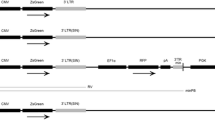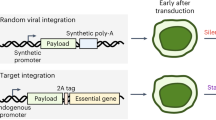Abstract
Gene transfer to provide long-term expression of a therapeutic product, without introducing unwelcome genetic information, is a goal being sought for therapy of both hereditary and acquired diseases. Polyoma virus pseudocapsids, generated from a VP1-expressing recombinant baculovirus, lack viral DNA and have been successfully used to introduce small exogenous genes stably into cells in vitro by a process designated ‘pseudofection’; although pseudocapsids protect only about 3 kbp of exogenous DNA, low efficiency transfer of a larger fragment (6.2 kbp) has been observed. Here, expression of a 7.2 kbp plasmid (pCMVβ) encoding the β-galactosidase gene was assessed to monitor not only efficiency, but the ability of pseudocapsids to transfer larger-sized DNA on their own, or in the presence of the polycation, poly-L-lysine, added to protect non-encapsidated DNA. When complexed to pseudocapsids only, the efficiency of expression of the transferred β-galactosidase gene (in human or rodent cells), although low, appeared to stabilise with time. In the presence of polylysine, unencapsidated DNA was shown to be protected against DNase activity, but electron microscopy (EM) revealed the formation of large mixed aggregates. The addition of pseudocapsids to these aggregates, and measurement of mobilities of the complexes in CsCl equilibrum centrifugation, indicated that they contained negligible amounts of VP1. For subsequent pseudofection experiments, DNA was complexed first with pseudocapsids, then polylysine was added. The latter did not appear to displace pseudocapsids from DNA, and was found to increase the efficiency of short-term expression both in in vitro and in vivo experiments. Gene expression, analysed histochemically or by the polymerase chain reaction, revealed transcriptional activity of the input gene, with expression first diminishing, then stabilising over time. The presence of pseudocapsids, in complexes with DNA with or without polylysine, allowed for stable and persistent gene expression.
Similar content being viewed by others
Author information
Authors and Affiliations
Rights and permissions
About this article
Cite this article
Soeda, E., Krauzewicz, N., Cox, C. et al. Enhancement by polylysine of transient, but not stable, expression of genes carried into cells by polyoma VP1 pseudocapsids. Gene Ther 5, 1410–1419 (1998). https://doi.org/10.1038/sj.gt.3300748
Received:
Accepted:
Published:
Issue Date:
DOI: https://doi.org/10.1038/sj.gt.3300748
- Springer Nature Limited
Keywords
This article is cited by
-
Efficient gene transfer using the human JC virus-like particle that inhibits human colon adenocarcinoma growth in a nude mouse model
Gene Therapy (2010)
-
Hamster polyomavirus-derived virus-like particles are able to transfer in vitro encapsidated plasmid DNA to mammalian cells
Virus Genes (2007)
-
Sustained ex vivo and in vivo transfer of a reporter gene using polyoma virus pseudocapsids
Gene Therapy (2000)
-
Virus-like gene transfer into cells mediated by polyoma virus pseudocapsids
Gene Therapy (2000)




